

Michio Kaku. Physics of the Future. Contents[edit] Each chapter is sorted into three sections: Near future (2000-2030), Midcentury (2030-2070), and Far future (2070-2100).
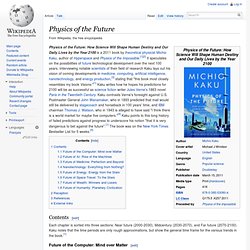
Stephen Hawking. English theoretical physicist, cosmologist, and author Stephen William Hawking CH CBE FRS FRSA (8 January 1942 – 14 March 2018) was an English theoretical physicist, cosmologist, and author who was director of research at the Centre for Theoretical Cosmology at the University of Cambridge at the time of his death.[18][19][8] He was the Lucasian Professor of Mathematics at the University of Cambridge between 1979 and 2009.
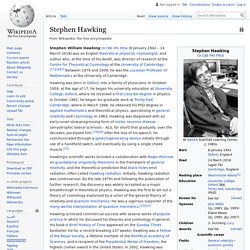
Hawking was born in Oxford, into a family of doctors. He began his university education at University College, Oxford, in October 1959 at the age of 17, where he received a first-class BA degree in physics. He began his graduate work at Trinity Hall, Cambridge, in October 1962, where he obtained his PhD degree in applied mathematics and theoretical physics, specialising in general relativity and cosmology in March 1966. Hawking achieved commercial success with several works of popular science in which he discussed his theories and cosmology in general. Early life Family. A Brief History of Time. Overview[edit] A Brief History of Time attempts to explain a range of subjects in cosmology, including the big bang, black holes and light cones, to the nonspecialist reader.
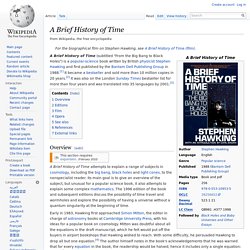
Its main goal is to give an overview of the subject, but unusual for a popular science book, it also attempts to explain some complex mathematics. Brian Cox (physicist) Brian Edward Cox OBE (born 3 March 1968)[1] is an English physicist and former musician, a Royal Society University Research Fellow, PPARC Advanced Fellow at the University of Manchester.[13][14] He is a member of the High Energy Physics group at the University of Manchester, and works on the ATLAS experiment at the Large Hadron Collider (LHC)[15][16] at CERN, near Geneva, Switzerland.

He is working on the research and development project of the FP420 experiment in an international collaboration to upgrade the ATLAS and the CMS experiment by installing additional, smaller detectors at a distance of 420 metres from the interaction points of the main experiments.[17][18][19][20] Cox's parents were bankers[1] and he attended the independent Hulme Grammar School[24] in Oldham from 1979 to 1986.[25][26][27] Cox revealed on The Jonathan Ross Show that he performed poorly on his Maths A-level: "I got a D ... I was really not very good ... I found out you need to practise. Neil deGrasse Tyson. Neil deGrasse Tyson (/ˈniːəl dəˈɡræs ˈtaɪsən/; born October 5, 1958) is an American astrophysicist, author, and science communicator.
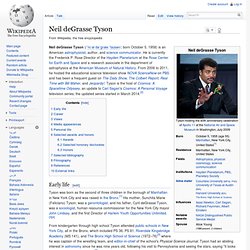
He is currently the Frederick P. Rose Director of the Hayden Planetarium at the Rose Center for Earth and Space and a research associate in the department of astrophysics at the American Museum of Natural History. From 2006 to 2011, he hosted the educational science television show NOVA ScienceNow on PBS and has been a frequent guest on The Daily Show, The Colbert Report, Real Time with Bill Maher, and Jeopardy!. Tyson is the host of Cosmos: A Spacetime Odyssey, an update to Carl Sagan's Cosmos: A Personal Voyage television series; the updated series started in March 2014.[2] Early life[edit] Astronomer Carl Sagan, who was a faculty member at Cornell University, tried to recruit Tyson to Cornell for undergraduate studies.[3] In an interview with writer Daniel Simone,[8] Tyson said: Promoting Cosmos TV series in Australia for National Geographic.
Brian Greene. Early life[edit] Greene was born in New York City.

His father, Alan Greene, was a one-time vaudeville performer and high school dropout who later worked as a voice coach and composer. He stated in an interview with Lawrence Krauss that he is of Jewish heritage. After attending Stuyvesant High School,[2] Greene entered Harvard in 1980 to concentrate in physics. After completing his bachelor's degree, Greene earned his doctorate from Oxford University as a Rhodes Scholar, graduating in 1987. The Elegant Universe. The Hidden Reality: Parallel Universes and the Deep Laws of the Cosmos. Brian Greene talks about The Hidden Reality on Bookbits radio.
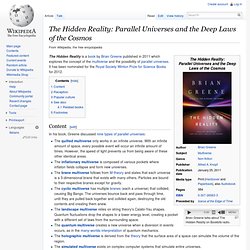
The Hidden Reality is a book by Brian Greene published in 2011 which explores the concept of the multiverse and the possibility of parallel universes. It has been nominated for the Royal Society Winton Prize for Science Books for 2012. Antony Garrett Lisi. Lisi is known for "An Exceptionally Simple Theory of Everything," a paper proposing a unified field theory based on the E8 Lie group, combining particle physics with Einstein's theory of gravitation.
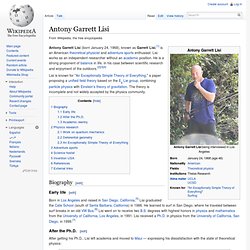
The theory is incomplete and not widely accepted by the physics community. Biography[edit] Early life[edit] After the Ph.D. [edit] After getting his Ph.D., Lisi left academia and moved to Maui — expressing his dissatisfaction with the state of theoretical physics: I got my PhD and looked at my options. Garry Davis. Sol Gareth "Garry" Davis (27 July 1921 – 24 July 2013) was an international peace activist who created the World Passport, a travel document originally based on the unrecognised concept of world citizenship.
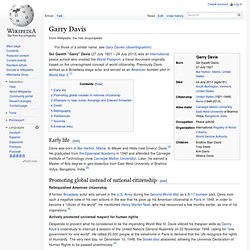
Previously Davis worked as a Broadway stage actor and served as an American bomber pilot in World War II.[1] Early life[edit] / - World Government of World Citizen - Welcome. Defending Yourself Against "Legal Fiction" We as living people no longer know or understand who we are and everything has been inverted upside down.

We have lost our identities and once again have given away our birthright for "bowl of pottage. " First Comment: Paul Greetings Henry, In our work to date, we have come across these claims several times: it's important to realize that some of themcan be substantiated with good authority, while othersappear to be theories that have somehow "morphed" into fact primarily for the one(s) asserting such claims. These two short essays are good places to begin,to acquire a necessary foundation: well that the U.S. Our letter to Bill Gates re: USA v. Timothy Leary. George Carlin. George Denis Patrick Carlin[1] (May 12, 1937 – June 22, 2008) was an American comedian, writer, social critic, and actor who won five Grammy Awards for his comedy albums.[2] Carlin was noted for his black comedy as well as his thoughts on politics, the English language, psychology, religion, and various taboo subjects.
Carlin and his "Seven dirty words" comedy routine were central to the 1978 U.S. Supreme Court case F.C.C. v. Atheism. Atheism is, in a broad sense, the rejection of belief in the existence of deities.[1][2] In a narrower sense, atheism is specifically the position that there are no deities.[3][4][5] Most inclusively, atheism is the absence of belief that any deities exist.[4][5][6][7] Atheism is contrasted with theism,[8][9] which, in its most general form, is the belief that at least one deity exists.[9][10][11] The term "atheism" originated from the Greek ἄθεος (atheos), meaning "without god(s)", used as a pejorative term applied to those thought to reject the gods worshiped by the larger society.[12] With the spread of freethought, skeptical inquiry, and subsequent increase in criticism of religion, application of the term narrowed in scope.
The first individuals to identify themselves using the word "atheist" lived in the 18th century during the Age of Enlightenment. Arguments for atheism range from the philosophical to social and historical approaches. Definitions and distinctions Range Concepts. Richard Dawkins. English ethologist, evolutionary biologist, and author Richard Dawkins FRS FRSL (born Clinton Richard Dawkins; 26 March 1941)[24] is a British ethologist, evolutionary biologist, and author.
He is an emeritus fellow of New College, Oxford, and was the University of Oxford's Professor for Public Understanding of Science from 1995 until 2008. Dawkins first came to prominence with his 1976 book The Selfish Gene, which popularised the gene-centred view of evolution and introduced the term meme.
With his book The Extended Phenotype (1982), he introduced into evolutionary biology the influential concept that the phenotypic effects of a gene are not necessarily limited to an organism's body, but can stretch far into the environment. In 2006, he founded the Richard Dawkins Foundation for Reason and Science. Dawkins is known as an outspoken atheist. The God Delusion. The God Delusion is a 2006 best-selling,[1] non-fiction book by English biologist Richard Dawkins, professorial fellow of New College, Oxford,[2][3] and former holder of the Charles Simonyi Chair for the Public Understanding of Science at the University of Oxford.
In The God Delusion, Dawkins contends that a supernatural creator almost certainly does not exist and that belief in a personal god qualifies as a delusion, which he defines as a persistent false belief held in the face of strong contradictory evidence. He is sympathetic to Robert Pirsig's statement in Lila that "when one person suffers from a delusion it is called insanity. When many people suffer from a delusion it is called religion".[4] The book has attracted widespread commentary, with many books written in response. Penn Jillette. Christopher Hitchens.